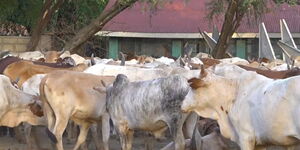The government on Thursday clarified concerns over new regulations in vegetable farming that would block more than 3 million farmers from supplying fruits and vegetables.
Earlier reports had indicated that the rules contained in the Kenya Standard 1758: 2016 (KS 1758) Horticulture Industry Code of Practice spelled out that before sowing a seed, farmers will be required to get an environmental impact assessment license from the National Environment Management Authority of Kenya (NEMA) which costs a minimum of Ksh10,000.
The government, through the Agriculture and Food Authority (AFA), however, clarified that it’s only large-scale farmers who would be required to obtain an environmental impact assessment.
“In the Standard, large-scale farmers whose farming activities can affect the environment are required to have an environmental impact assessment,” read part of the statement.
"This is aimed at ensuring sustainable farming and conservation of the environment and applies only to farmers who choose to be certified under the standard.”
The Vegetable Bill indicates that only large farmers, companies, and importers will be permitted to supply fruit and vegetables in Kenya, with any trader buying fruit and vegetables from uncertified farmers facing stiff penalties.
AFA, however, clarified that subscription to the standard is not mandatory and farmers are at liberty to be certified to the Standard or not. Equally, no trader is prevented from purchasing produce from uncertified farmers.
The agency explained that the certification is meant to ensure crops are produced under certification standards that meet global requirements.
“At a global level, there are numerous certification standards for different markets and different market destinations have a preference for particular standards. Certification to any of the standards therefore gives an advantage of access to those particular markets requiring that Standard,” the statement elaborated.
Farmers selling fruits, spices, vegetables or herbs inside Kenya will also be required to use fertiliser only after conducting ‘regular’ soil, water, or plant tests.
According to the Standards, tests for soil analysis will cost Ksh2,500 and Ksh4,700 for water tests from the Kenya Forestry Research Institute (KFRI).
AFA has defended the cost of certification noting it will be determined by the certifying body and the level of compliance by the farmer at the point of application for certification.
“The Authority takes cognizance of the fact that this may pose a challenge to individual (small-scale) farmers who may desire to be certified. To address this, both the Authority and private sector players in the industry have been seeking support from development partners, to support farmer certification.,” AFA added.
Under the new rules, to then sell their produce in local markets, farmers will have to be logged into the National Horticulture Traceability System (NHTS).












